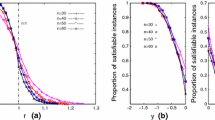Abstract
The random constraint satisfaction problem (CSP) instances generated by Model RB have been widely used in the field of CSP and have some nice features. In this paper, we consider two optimization versions of CSP, i.e., the maximum constraint satisfaction problem (Max-CSP) and the minimum satisfaction problem (Min-CSP) of Model RB. The problem of the Max-CSP is how to find an assignment to all the variables such that the maximum number of constraints are satisfied and the problem of Min-CSP is how to find an assignment to all the variables such that the minimum number of constraints are satisfied. We use the first moment method to prove that when r > 2α(1/p−1) (or p > 2α/(2α+r)), an upper bound of Max-CSP can be derived. Similarly, we can prove that when r > 2α(1/p−1) (or p > 2α/(2α + r)), a lower bound of Min-CSP can be derived.
Similar content being viewed by others
References
Shannon C E. A mathematical theory of communication. Bell Syst Tech J, 1948, 27:379–423
Creignou N, Khanna S, Sudan M. Complexity Classifications of Boolean Constraint Satisfaction Problems. In: Monographs on Discrete Mathematics and Applications, Vol. 7. SIAM, 2001
Hell P, Nesetril J. Graphs and Homomorphisms. Oxford University Press, 2004
Cheeseman P, Kanefsky B, Taylor W M. Where the really hard problems are. In: Proceedings of IJCAI-91, Sydney, 1991. 331–337
Kaporis A C, Kirousis L M, Lalas E G. The probabilistic analysis of a greedy satisfiability algorithm. Random Struct Algor, 2006, 28:444–480
Díaz Cort J, Lefteris K, Mitsche D, et al. A new upper bound for 3-SAT. In: Proceedings of FSTTCS’ 08, Bangalore, 2008. 163–174
Smith B M, Dyer M E. Locating the phase transition in binary constraint satisfaction problems. Artif Intell, 1996, 81:155–181
Achlioptas D, Kirousis L M, Kranakis E, et al. Stamatiou: Random Constraint Satisfaction: A More Accurate Picture. Berlin/Heidelberg: Springer, 1997. 107–120
Xu K, Boussemart F, Hemery F, et al. Random constraint satisfaction: easy generation of hard (satisfiable) instances. Artif Intell, 2007, 171:514–534
Xu K, Li W. Exact phase transitions in random constraint satisfaction problems. J Artif Intell Res, 2000, 12:93–103
Huang P, Yin M H, Xu K. Exact phase transitions and approximate algorithm of #CSP. In: Proceedings of the 25th AAAI Conference on Artificial Intelligence, San Francisco, 2011. 1790–1791
Bollobás B, Borgs C, Chayes J T, et al. The scaling window of the 2-SAT transition. Random Struct Algor, 2001, 18:201–256
Gramm J, Hirsch E A, Niedermeier R, et al. Worst-case upper bounds for MAX-2-SAT with an application to MAXCUT. Discrete Appl Math, 2003, 130:139–155
Hirsch E A. A new algorithm for MAX-2-SAT. In: Proceedings of 17th International Symposium on Theoretical Aspects of Computer Science. Lect Notes in Comput Sci, vol. 1770. Springer-Verlag, 2000. 65–73
Coppersmith D, Gamarnik D, Hajiaghayi M T, et al. Random MAX SAT, random MAX CUT, and their phase transitions. Random Struct Algor, 2004, 24:502–545
Xu X L, Gao Z S, Xu K. A tighter upper bound for random MAX 2-SAT. Inf Process Lett, 2011, 111:115–119
Li C M, Zhu Z, Manyà F, et al. Minimum satisfiability and its applications. In: Proceedings of the 22nd International Joint Conference on Artificial Intelligence, Bellaterra, 2011. 605–610
Achlioptas D, Gomes C, Kautz H, et al. Generating satisfiable problem instances. In: Proceedings of the 17th National Conference on Artificial Intelligence and 12th Conference on Innovative Applications of Artificial Intelligence, 2000. 256–261
Liu T, Lin X, Wang C, et al. Large hinge width on sparse random hypergraphs. In: Proceedings of the 22th International Joint Conference on Artificial Intelligence, vol. 1, 2011. 611–616
Xu K, Li W. Many hard examples in exact phase transitions. Theor Comput Sci, 2006, 355:291–302
Zhou J, Huang P, Yin M, et al. Phase transitions of EXPSPACE-complete problems. Int J Found Comput Sci, 2010, 21:1073–1088
Zhou J, Yin M, Li X, et al. Phase transitions of EXPSPACE-complete problems: a further step. Int J Found Comput Sci, 2012, 23:173–184
Gao J, Yin M, Xu K. Phase Transitions in Knowledge Compilation: An Experimental Study. Berlin/Heidelberg: Springer, 2011. 364–366
Author information
Authors and Affiliations
Corresponding author
Rights and permissions
About this article
Cite this article
Huang, P., Yin, M. An upper (lower) bound for Max (Min) CSP. Sci. China Inf. Sci. 57, 1–9 (2014). https://doi.org/10.1007/s11432-013-5052-x
Received:
Accepted:
Published:
Issue Date:
DOI: https://doi.org/10.1007/s11432-013-5052-x




